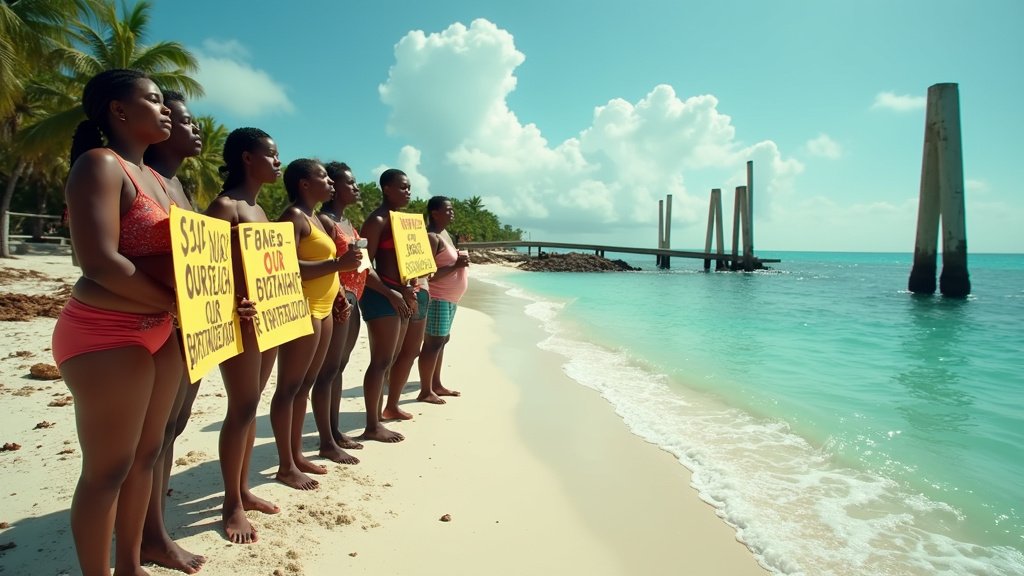In a significant legal challenge for public access rights in Jamaica, community advocates and environmental groups have filed a lawsuit aimed at defending local access to Providence Beach in Montego Bay. The action, initiated by the Jamaica Beach Birthright Environmental Movement (JaBBEM) and the Flanker Resource Centre, along with affected communities, targets the planned development of a new resort by Sandals Resort International (SRI) which includes overwater bungalows.
Legal Action Initiated Amidst Development Plans
The lawsuit, filed in the St. James Parish Court on October 6, 2025, seeks to secure public rights to Providence Beach and its vital sea channels. Campaigners are leveraging the Prescription Act of 1882, asserting that decades of community use have established a legal right to access the beach and adjacent waterways. The core of their argument is that SRI’s proposed development threatens to displace residents and effectively privatize a crucial communal space. According to court documents, part of the access route to the beach traverses land owned by a private company, further complicating public ingress.
Sandals’ Vision and Community Opposition
Sandals Resort International’s ambitious project includes the construction of 18 overwater bungalows, pylons, a supporting boardwalk, villa suites, and significant coastal modification. While such developments are often promoted for their economic contributions, including job creation, local groups argue that the benefits are disproportionately small compared to the social and environmental costs. An Environmental Impact Assessment (EIA) report for the Sandals project reportedly lists approximately 50 low-wage jobs, raising questions about the genuine economic return for the broader Jamaican population. Furthermore, campaigners highlight that similar developments in other Caribbean islands often fill higher-paying management roles with foreign workers, repatriating profits offshore.
The Legacy of the Beach Control Act of 1956
A central point of contention is Jamaica’s colonial-era Beach Control Act of 1956. Campaigners and legal experts widely criticize this legislation, arguing it strips Jamaicans of inherent rights to their beaches and coastal waters. The Act, which predates Jamaica’s independence, effectively vests ownership in the Crown and requires licenses for beach use, paving the way for privatization. Dr. Devon Taylor, President of JaBBEM, has consistently stated that this law is outdated and discriminatory, preventing Jamaicans from accessing what should be their natural birthright. JaBBEM advocates for its immediate repeal and replacement with modern legislation that constitutionally guarantees unfettered access to all beaches and rivers.
Calls for Modern Legislation and Regulatory Transparency
The legal battle underscores a broader, ongoing struggle across Jamaica for equitable access to coastal resources. Communities fear that the privatization of shorelines is not only depriving them of recreational and spiritual spaces but also threatening the livelihoods of local fishermen. The National Environment and Planning Agency (NEPA) has faced criticism for not providing public communications regarding the approval status of the Sandals project, raising concerns about transparency in the development process. Campaigners urge the Jamaican government to enact legislation that prohibits the appropriation of sea spaces and guarantees fundamental access rights.
Broader Implications for Jamaica’s Coastline
The fight over Providence Beach is emblematic of a larger trend impacting Jamaica and the wider Caribbean. The relentless push for tourism development, often prioritizing foreign investment, has led to the erosion of public spaces and a disconnect from cultural heritage for many citizens. While official statements acknowledge the importance of beach access, concrete legislative reforms have been slow. The ongoing news from Montego Bay highlights the critical need for policy changes that protect Jamaica’s natural beauty and ensure its coastal resources remain accessible to all Jamaicans, safeguarding both environmental integrity and community well-being for future generations.

